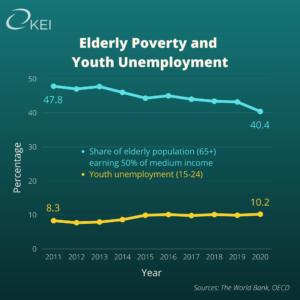The Peninsula
Legal Challenge to Wage Cap on Older Workers

In May, South Korea’s Supreme Court ruled in favor of a plaintiff who sought back pay from his former employer who had capped his wage on the basis of his age. Korean firms practice a “peak wage” system, which gradually cuts the salary of older workers as they approach retirement. The policy is intended to free up funds to hire younger employees and the government partially subsidizes the wages of older workers to extend their working years. While its adoption intended to promote youth employment, the system positions that objective and elderly welfare as mutually exclusive priorities.
 Currently, 52% of private companies with 300 or more employees practice the peak wage system. In 2015, President Park Geun-hye aimed to increase youth employment through a “targeted reformation” of the labor market, calling for the expansion of the peak wage system to the public sector. The appeal of the peak wage system may come from the fact that seniority impacts salary growth in Korea more significantly than in other peer economies, and is perceived as a potential roadblock to new hires.
Currently, 52% of private companies with 300 or more employees practice the peak wage system. In 2015, President Park Geun-hye aimed to increase youth employment through a “targeted reformation” of the labor market, calling for the expansion of the peak wage system to the public sector. The appeal of the peak wage system may come from the fact that seniority impacts salary growth in Korea more significantly than in other peer economies, and is perceived as a potential roadblock to new hires.
However, some companies adopted the peak wage policy hastily without consultation or negotiations with unions or employees. As a consequence, the recent court ruling is galvanizing workers who faced sudden wage caps to make legal challenges.
Simultaneously, the peak wage policy has so far proven ineffective at addressing youth unemployment. Since the emergence of the policy, youth unemployment has fluctuated but held steady at around 10%. Meanwhile, elderly poverty in Korea remains the highest among advanced economies. This adds to skepticism on whether a policy capping the wages of elderly workers necessarily maximizes welfare.
This briefing comes from Korea View, a weekly newsletter published by the Korea Economic Institute. Korea View aims to cover developments that reveal trends on the Korean Peninsula but receive little attention in the United States. If you would like to sign up, please find the online form here.
Korea View was edited by Yong Kwon with the help of Sarah Marshall and Mai Anna Pressley. Picture from the flickr account of Hoks.
